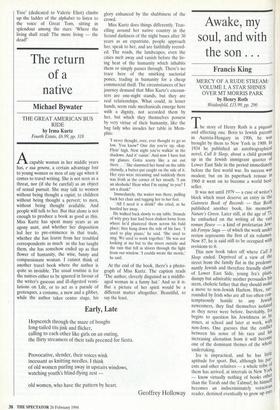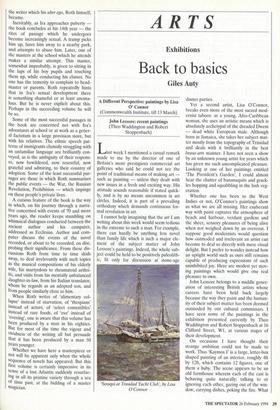Awake, my soul, and with the son . . .
Francis King
MERCY OF A RUDE STREAM: VOLUME I, A STAR SHINES OVER MT MORRIS PARK by Henry Roth Weidenfeld, £15.99, pp. 290 The story of Henry Roth is a piquant and affecting one. Born to Jewish parents in Austria-Hungary in 1906, he was brought by them to New York in 1909. In 1934 he published an autobiographical novel, Call It Sleep, about a child growing up in the Jewish immigrant quarter of Lower East Side in the period immediatelY before the first world war. Its success was modest; but on its paperback reissue ill 1960 it went on to become a world best- seller.
It was not until 1979 — a case of writer's block which must deserve an entry in the Guinness Book of Records — that Roth published another book, his memoirs, Nature's Green. Later still, at the age of 73, he embarked on the writing of the vast roman fleuve — a kind of proletarian JO- ish Forsyte Saga — of which the work under review represents the first of six volumes. Now 87, he is said still to be occupied with revisions to it.
This new book takes off where Call It Sleep ended. Deprived of a view of the street from the family flat in the predomi.' nantly Jewish and therefore friendly slums of Lower East Side, young Ira's plain, dumpy but admirable mother persuades his stern, choleric father that they should make a move to non-Jewish Harlem. Here, sta.' rounded by Irish who are all too often cow temptuously hostile to any Jewish newcomers, they find themselves isolated as they never were before. Inevitably, Ire begins to question his Jewishness as he mixes, at school and later at work, with non-Jews. One guesses that the conflict between his sense of his race and his increasing alienation from it will become one of the dominant themes of the whole undertaking. Ira is impractical, and he has little aptitude for sport. But, although his par- ents and other relatives — a whole tribe o' them has arrived, at intervals in New York know virtually nothing of books other, than the Torah and the Talmud, he himseh becomes an indiscriminately voracious reader, destined eventually to grow up int° the writer which his alter ego, Roth himself, became.
Inevitably, as Ira approaches puberty — the book concludes at his 14th year — the rites of passage which he undergoes become increasingly sexual. A tramp picks him up, lures him away to a nearby park, and attempts to abuse him. Later, one of the masters at the school which he attends makes a similar attempt. This master, somewhat improbably, is given to sitting in the laps of his boy pupils and touching them up, while conducting his classes. No one has the temerity to complain to head- master or parents. Roth repeatedly hints that in Ira's sexual development there is something shameful or at least anoma- lous. But he is never explicit about this. Perhaps in the succeeding volume he will be so.
Some of the most successful passages in the book are concerned not with Ira's adventures at school or at work as a gener- al factotum in a large provision store, but with his relatives. The ethnic speech pat- terns of immigrants clumsily struggling with
an unfamiliar language are brilliantly con-
veyed, as is the ambiguity of their respons- es, now bewildered, now resentful, now grateful and admiring, to their country of adoption. Some of the least successful pas- sages are those in which Roth summarises the public events — the War, the Russian Revolution, Prohibition — which impinge on these people's private lives.
A curious feature of the book is the way in which, on his journey through a narra-
tive concerned with events of 70 and more years ago, the reader keeps stumbling on Whimsical dialogues conducted between the ancient author and his computer, addressed as Ecclesias. Author and com- puter discuss the events of the novel recorded, or about to be recorded, on disc, probing their significance. From these dis- cussions Roth from time to time skids away, to deal irrelevantly with such topics as the musical compositions of his elderly Wife, his martyrdom to rheumatoid arthri- tis, and visits from his mentally unbalanced 'laughter-in-law, from his Italian translator, Whom he regards as an adopted son, and from people similarly close to him.
When Roth writes of 'alimentary col- lapse' instead of starvation, of 'thespians' instead of actors, of 'select comestibles' Instead of rare foods, of 'eve' instead of 'evening', one is aware that this volume has been produced by a man in his eighties. But for most of the time the vigour and vividness 'of the writing all but persuade that it has been produced by a man 50 years younger. Whether we have here a masterpiece or not will be apparent only when the whole sequence of novels has appeared. But this first volume is certainly impressive in its sense of a lost Atlantis suddenly resurfac- ing in all its pristine variety through a sea of time past, at the bidding of a master magician.



























































 Previous page
Previous page